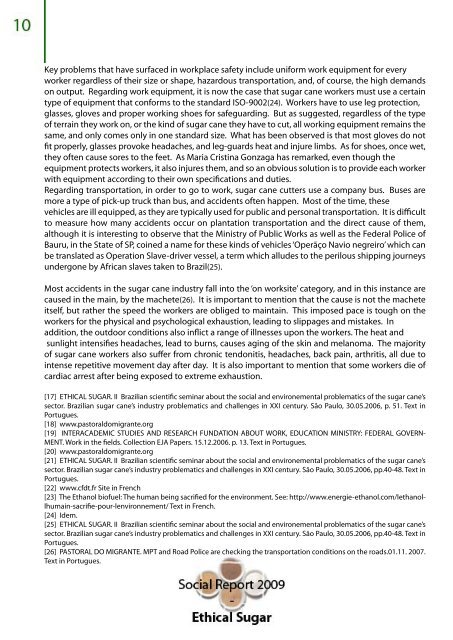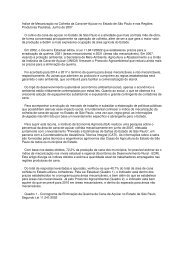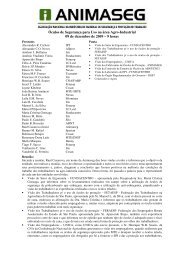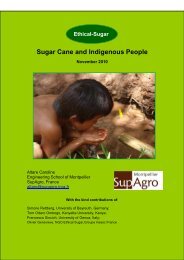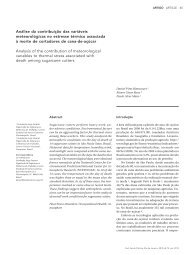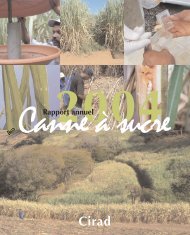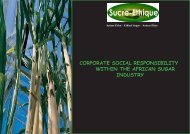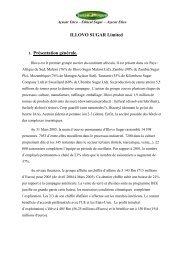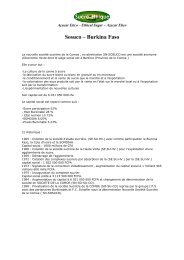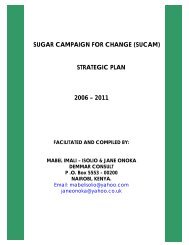Social Report Brazil 2009 - Sucre Ethique
Social Report Brazil 2009 - Sucre Ethique
Social Report Brazil 2009 - Sucre Ethique
Create successful ePaper yourself
Turn your PDF publications into a flip-book with our unique Google optimized e-Paper software.
Key problems that have surfaced in workplace safety include uniform work equipment for everyworker regardless of their size or shape, hazardous transportation, and, of course, the high demandson output. Regarding work equipment, it is now the case that sugar cane workers must use a certaintype of equipment that conforms to the standard ISO-9002(24). Workers have to use leg protection,glasses, gloves and proper working shoes for safeguarding. But as suggested, regardless of the typeof terrain they work on, or the kind of sugar cane they have to cut, all working equipment remains thesame, and only comes only in one standard size. What has been observed is that most gloves do notfit properly, glasses provoke headaches, and leg-guards heat and injure limbs. As for shoes, once wet,they often cause sores to the feet. As Maria Cristina Gonzaga has remarked, even though theequipment protects workers, it also injures them, and so an obvious solution is to provide each workerwith equipment according to their own specifications and duties.Regarding transportation, in order to go to work, sugar cane cutters use a company bus. Buses aremore a type of pick-up truck than bus, and accidents often happen. Most of the time, thesevehicles are ill equipped, as they are typically used for public and personal transportation. It is difficultto measure how many accidents occur on plantation transportation and the direct cause of them,although it is interesting to observe that the Ministry of Public Works as well as the Federal Police ofBauru, in the State of SP, coined a name for these kinds of vehicles ‘Operãço Navio negreiro’ which canbe translated as Operation Slave-driver vessel, a term which alludes to the perilous shipping journeysundergone by African slaves taken to <strong>Brazil</strong>(25).Most accidents in the sugar cane industry fall into the ‘on worksite’ category, and in this instance arecaused in the main, by the machete(26). It is important to mention that the cause is not the macheteitself, but rather the speed the workers are obliged to maintain. This imposed pace is tough on theworkers for the physical and psychological exhaustion, leading to slippages and mistakes. Inaddition, the outdoor conditions also inflict a range of illnesses upon the workers. The heat andsunlight intensifies headaches, lead to burns, causes aging of the skin and melanoma. The majorityof sugar cane workers also suffer from chronic tendonitis, headaches, back pain, arthritis, all due tointense repetitive movement day after day. It is also important to mention that some workers die ofcardiac arrest after being exposed to extreme exhaustion.[17] ETHICAL SUGAR. II <strong>Brazil</strong>ian scientific seminar about the social and environemental problematics of the sugar cane’ssector. <strong>Brazil</strong>ian sugar cane’s industry problematics and challenges in XXI century. São Paulo, 30.05.2006, p. 51. Text inPortugues.[18] www.pastoraldomigrante.org[19] INTERACADEMIC STUDIES AND RESEARCH FUNDATION ABOUT WORK, EDUCATION MINISTRY: FEDERAL GOVERN-MENT. Work in the fields. Collection EJA Papers. 15.12.2006. p. 13. Text in Portugues.[20] www.pastoraldomigrante.org[21] ETHICAL SUGAR. II <strong>Brazil</strong>ian scientific seminar about the social and environemental problematics of the sugar cane’ssector. <strong>Brazil</strong>ian sugar cane’s industry problematics and challenges in XXI century. São Paulo, 30.05.2006, pp.40-48. Text inPortugues.[22] www.cfdt.fr Site in French[23] The Ethanol biofuel: The human being sacrified for the environment. See: http://www.energie-ethanol.com/lethanollhumain-sacrifie-pour-lenvironnement/Text in French.[24] Idem.[25] ETHICAL SUGAR. II <strong>Brazil</strong>ian scientific seminar about the social and environemental problematics of the sugar cane’ssector. <strong>Brazil</strong>ian sugar cane’s industry problematics and challenges in XXI century. São Paulo, 30.05.2006, pp.40-48. Text inPortugues.[26] PASTORAL DO MIGRANTE. MPT and Road Police are checking the transportation conditions on the roads.01.11. 2007.Text in Portugues.


